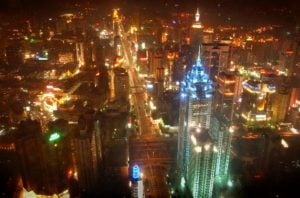 I just spent my Saturday morning doing some solid nerding. By that I mean, I read two great articles about that rising behemoth, China. The first was ‘China’s Bumpy Road Ahead by international consultant and geopolitical analyst Ian Bremmer. Bremmer, has a blog at Foreign Policy that features many guest writers and covers impactful global events, has been a long time favorite of mine and his pieces are always informative and usually provide a long term strategic outlook. (You might say Bremmer is brimming with insight!) His ‘Bumpy Road’ article is no different as it attempts to temper the conventional wisdom that China’s rise and eventual replacement of the United States as a world power is a slam dunk, home run, and another American sports cliche. Bremmer makes a compelling list of the challenges the Middle Kingdom has to still overcome, including:
I just spent my Saturday morning doing some solid nerding. By that I mean, I read two great articles about that rising behemoth, China. The first was ‘China’s Bumpy Road Ahead by international consultant and geopolitical analyst Ian Bremmer. Bremmer, has a blog at Foreign Policy that features many guest writers and covers impactful global events, has been a long time favorite of mine and his pieces are always informative and usually provide a long term strategic outlook. (You might say Bremmer is brimming with insight!) His ‘Bumpy Road’ article is no different as it attempts to temper the conventional wisdom that China’s rise and eventual replacement of the United States as a world power is a slam dunk, home run, and another American sports cliche. Bremmer makes a compelling list of the challenges the Middle Kingdom has to still overcome, including:
this is a country that measures its annual supply of large-scale protests in the tens of thousands. For 2006, China’s Academy of Social Sciences reported the eruption of about 60,000 “mass group incidents,” an official euphemism for demonstrations of public anger involving at least 50 people. In 2007, the number jumped to 80,000. Though such figures are no longer published, a leak put the number for 2008 at 127,000. Today, it is almost certainly higher.
There is certainly no credible evidence that China is on the brink of an unforeseen crisis, but all that public anger points to enormous challenges on the road ahead. Emerging powers like India, Brazil and Turkey can continue to grow for the next 10 years with the same basic formula that sparked growth over the past 10. China, on the other hand, must undertake enormously complex and ambitious reforms to continue its drive to become a modern power, and the country’s leadership knows it.
The financial crisis made clear that China’s dependence for growth on the purchasing power of consumers in America, Europe and Japan creates a dangerous vulnerability.
A few weeks ago, I highlighted Henry Kissinger’s excerpt of his new book ‘On China’, which I was surprised to learn was about China. Have you stopped laughing? Good, I’ll continue. Well, I found an excellent review of Kissinger’s latest book by Zachary Keck from E-International Relations. Keck does a reader friendly, old fashioned book review where he smoothly intertwines Kissinger’s prior books and IR philosophies as well as other major works on the topic with ‘On China’. Keck was as impressed as I was with Kissinger’s emphasis and ‘ability to portray [the] mindset’ of various Chinese leaders:
Although China’s offensive deterrence is borne out of geopolitical realities, Kissinger does not overlook the importance of individual leaders. Indeed, one of the most noteworthy parts of the book is Kissinger’s intense focus on the nature of individual leaders and his ability to illustrate the dilemmas they faced. Given his nearly unprecedented access to a vast range of high-ranking officials on both sides of the relationship, Kissinger is uniquely qualified to tell this history. In doing so, Kissinger allows the reader to “look over the shoulder” of the statesmen in the best traditions of Classical Realism.
Overall, Kissinger portrays leaders in both countries in a fairly positive manner. This is especially true with American Presidents and occasionally their advisers (most notably, Zbigniew Brzezinski and Winston Lord), whom Kissinger finds little to criticize.
Although similar in many respects to his portrayals of American leaders, ultimately Kissinger’s accounts of their Chinese counterparts are more interesting. Kissinger clearly understands the difficult conundrums Chinese leaders often face when weighing the importance of good relations with the United States against domestic political considerations. Kissinger’s ability to put the reader in the minds of Chinese officials is the aspect of the book that will likely be the most enticing to current and future diplomats dealing with China.
Keck ends his review with an analysis of the current battle between Republican Party’s two main foreign policy schools: Realists vs. Neoconservatives. Keck is more sympathetic to Kissinger’s realism-based view of a rising China, arguing that at this moment, it provides the ‘best prospects for peace’.
I enjoyed my ‘China’s Rise’ morning of nerdy reading, now it’s your turn. Get to those articles!